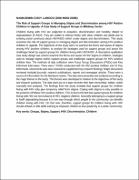| dc.description.abstract | NAMUZIMBI CISSY LUBOGO (2008-M092-20086)
The Role of Support Groups in Managing Stigma and Discrimination among HIV Positive Children in Uganda: A Case Study of Support Groups in Mildmay Centre
Children living with HIV are subjected to prejudice, discrimination and hostility related to stigmatisation of AIDS. They are unable to interact freely with other children and adults due to existing social constructs about HIV/AIDS which create stigma and discrimination. This study examines the role of support groups in managing stigma and discrimination among HIV positive children in Uganda. The objectives of the study were; to examine the forms and causes of stigma among HIV positive children, to analyse the strategies used by support groups and assess the challenges faced by support groups for children living with HIV/AIDS. A descriptive qualitative case study design was used to examine the forms and causes of HIV stigma in children, strategies used to manage stigma within support groups and challenges support groups for HIV positive children face. The methods of data collection were Focus Group Discussions (FGDs) and Key Informant Interviews. There were 7 FGDs conducted with 55 HIV positive children and 10 Key Informants. Documents were also reviewed to supplement key research findings. Major documents reviewed included journals, research publications, reports and newspaper articles. These were a source of information for the literature review. The data were presented and analysed according to the major themes in the study. The themes were developed in relation to the objectives of the study and research questions. The data were put on a tape recorder then later transcribed, edited, coded manually and analysed. The findings from the study revealed that support groups for children living with HIV only give temporary relief from stigma. Coping with stigma is only possible in the presence of fellow HIV positive children. This is due to the fact that support groups for children living with HIV are not inclusive of HIV negative children. Secondly belonging to a support group is itself stigmatising because it is one way through which people in the community can identify children living with HIV. On that note, therefore, support groups for children living with HIV should embark on life skills training to empower children to live positively in a wider community.
Key words: Groups, Stigma, Support, HIV, Discrimination, Children | en_US |


